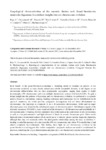Karyological Characterization of the Endemic Iberian Rock Lizard, Iberolacerta Monticola (Squamata, Lacertidae): Insights into Sex Chromosome Evolution

View/
Use this link to cite
http://hdl.handle.net/2183/19237Collections
- Investigación (FCIE) [1227]
Metadata
Show full item recordTitle
Karyological Characterization of the Endemic Iberian Rock Lizard, Iberolacerta Monticola (Squamata, Lacertidae): Insights into Sex Chromosome EvolutionAuthor(s)
Date
2013-12Citation
Rojo V, Giovannotti M, Naveira H, Nisi Cerioni P, González-Tizón A, Caputo Barucchi V, Galán P, Olmo E, Martínez-Lage A, Karyological characterization of the endemic iberian rock lizard, Iberolacerta monticola (Squamata, Lacertidae): insights into sex chromosome evolution. Cytogenet Genome Res 2014;142:28-39 (DOI: 10.1159/000356049)
Abstract
[Abstract] Rock lizards of the genus Iberolacerta constitute a promising model to examine the process of sex chromosome evolution, as these closely related taxa exhibit remarkable diversity in the degree of sex chromosome differentiation with no clear phylogenetic segregation, ranging from cryptic to highly heteromorphic ZW chromosomes and even multiple chromosome systems (Z1Z1Z2Z2/Z1Z2W). To gain a deeper insight into the patterns of karyotype and sex chromosome evolution, we performed a cytogenetic analysis based on conventional staining, banding techniques and fluorescence in situ hybridization in the species I. monticola, for which previous cytogenetic investigations did not detect differentiated sex chromosomes. The karyotype is composed of 2n = 36 acrocentric chromosomes. NORs and the major ribosomal genes were located in the subtelomeric region of chromosome pair 6. Hybridization signals of the telomeric sequences (TTAGGG)n were visualized at the telomeres of all chromosomes and interstitially in 5 chromosome pairs. C-banding showed constitutive heterochromatin at the centromeres of all chromosomes, as well as clear pericentromeric and light telomeric C-bands in several chromosome pairs. These results highlight some chromosomal markers which can be useful to identify species specific diagnostic characters, although they may not accurately reflect the phylogenetic relationships among the taxa. In addition, C-banding revealed the presence of a heteromorphic ZW sex chromosome pair, where W is smaller than Z and almost completely heterochromatic. This finding sheds light on sex chromosome evolution in the genus Iberolacerta and suggests that further comparative cytogenetic analyses are needed to understand the processes underlying the origin, differentiation and plasticity of sex chromosome systems in lacertid lizards.
Keywords
Chromosome banding
Comparative cytogenetics
FISH
Rock lizards
Sex chromosomes
Comparative cytogenetics
FISH
Rock lizards
Sex chromosomes
Editor version
Rights
This is the peer-reviewed but unedited manuscript version of the following article: Rojo V, Giovannotti M, Naveira H, Nisi Cerioni P, González-Tizón A, Caputo Barucchi V, Galán P, Olmo E, Martínez-Lage A, Karyological characterization of the endemic iberian rock lizard, Iberolacerta monticola (Squamata, Lacertidae): insights into sex chromosome evolution. Cytogenet Genome Res 2014;142:28-39 (DOI: 10.1159/000356049). The final, published version is available at http://www.karger.com/?doi=10.1159/000356049.
ISSN
1424-8581
1424-859X
1424-859X





